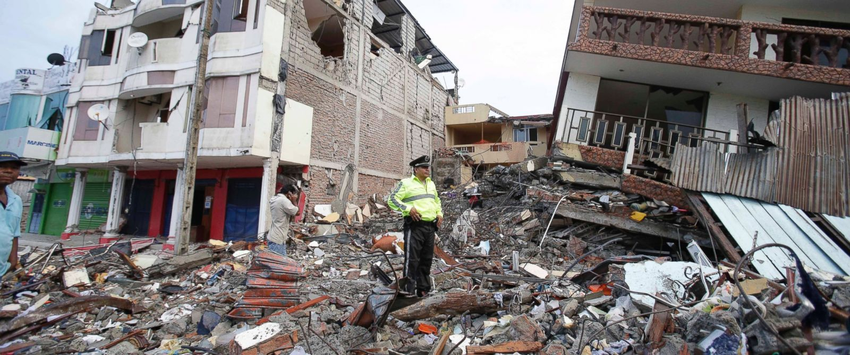Ecuador earthquake: Diaspora group plans fundraiser to help victims
The April 16 Ecuador earthquake that devastated towns along the country’s scenic Pacific coast is the worst natural disaster to hit Ecuador since 1949, and the deadliest quake to rattle South America in 17 years.
The recent death toll stood at 654, with about 16,600 people injured and another 58 missing. About 113 people were rescued from damaged buildings — which number in the thousands — and some 25,000 people are now living in shelters.The U.S. Geological Survey located the quake’s epicenter 27 kilometers south-southeast of Muisne, in the province of Esmeraldas.
The earthquake, (7.8 magnitude) which struck at a depth of 19 kilometers, also hit southern Colombia and northern Peru.. In Quito, about 170 kilometers from the epicenter, the earthquake was felt for about 40 seconds, and frightened people fled buildings into the streets.
National authorities deployed 10,000 soldiers and 3,500 police officers to assist in rescue efforts, and maintain law and order. The government also dispatched 200 firefighters to Pedernales in Manabí — one of the closest population centers to the epicenter — and 300 more to other cities throughout the coastal province, while the military mobilized canine units to aid the search for survivors and bodies.
“These have been sad days for the homeland,” President Rafael Correa said. “The country is in crisis.”Correa’s ambassador in Washington, Francisco José Borja Cevallos, told us he’s been heartened by the outpouring of assistance from the Ecuadorian diaspora living in the United States as well as the U.S. government.
“We have mobilized Ecuadorians living in this country, and have solicited help from the U.S. government,” he said. “Their response has been fantastic. Cargo planes have delivered more than 80 tons of humanitarian supplies.”
He said the $600,000 initially committed by the Obama administration — plus another $6 million in food aid — is nothing compared to the $3 billion Correa’s leftist government estimates it will cost to rebuild.
About 6,000 Ecuadorians live in the District, Maryland and Virginia.“But now, what we need most is money to buy what we need and rebuild the houses of those affected,” he said. “Very soon, we’re going to stop accepting food and clothing, and accept only cash. More than 25,000 people are homeless.”
A local diaspora organization is planning an April 30 fundraising event — called “Campaña Mano Amiga” for earthquake victims — to take place at 13800 Blair Stone Lane, Silver Spring, MD 20906.
The lunch and cocktail party, which goes from noon until 6 p.m. will include live music by local artists, auctions of original paintings, raffles, games and other activities. A minimum $20 donation will cover food, with proceeds going directly to Ecuador.The party is jointly organized by the Federation of Ecuadorian Entities Abroad (FEDEE in Spanish) and the Holy Land Christian Ecumenical Foundation (HCEF).
“I’m doing this because there are hundreds, if not thousands, of Ecuadorians in great need of help, and I believe anyone in a position to help in anyway possible should do it,” said Ormaza, a Maryland-based journalist and president of FEDEE’s Washington chapter.
“Before the earthquake, Ecuadorians were already going through hardship as a result of living in an oil-dependent economy. This is just going to make things worse for them. They need all the help they can get.”
FEDEE’s goal is to build from scratch 30 houses, rebuild 30 houses and provide construction material to 40 families with the ability to build their own homes with these materials. These construction projects will create 500 jobs and improve the lives of 700 to 1,000 people.
The organization already has sent food, water and other supplies to quake victims in Portoviejo, which received the shipment April 23. Those wishing to donate money can do so online, or through Citibank (account number 36360112 / Terremoto Ecuador).
This story was first published in the Washington Diplomat. It is edited here by Baltimore Post-Examiner for length.

Larry Luxner is a freelance writer with The Washington Diplomat and former editor of CubaNews. Born and raised in Miami and now based in Israel, Larry has reported from every country in the Western Hemisphere. His specialty is Latin America and the Middle East, and he’s written more than 2,000 articles for publications ranging from National Journal to Saudi Aramco World. Larry also runs an Internet-based stock photo agency at www.luxner.com.

